Mass Spectrometry Facility
The School of Pharmacy Mass Spectrometry Facility was established in 2007 to centralize and organize the mass spectrometry instrumentation and proteomics capabilities. Since then, the facility has expanded again, with the arrival of the Reisdorph Lab in 2015. The facility now boasts over 13 mass spectrometers with capabilities spanning proteomics, metabolomics, small molecule analysis, and beyond.
The facility was established by the School of Pharmacy to centralize and organize the mass spectrometry instrumentation and proteomics capabilities. The purpose of the facility is to provide support to the faculty members of the Department of Toxicology and Department of Pharmaceutical Sciences and to the greater University of Colorado. The facility utilizes advanced mass spectrometry instrumentation and techniques to assist researchers with their proteomic, metabolomics, and small molecule research. As a department resource we strive to foster an educational and collaborative environment, and are committed to providing personal service to its users.
Opportunities for collaboration span the academic and industrial sectors in the state of Colorado as well as nationwide. Training in metabolomics/proteomics is periodically offered to researchers interested in incorporating “omics” into their research program.
For a comprehensive review of our Mass Spectrometry Core capabilities, please watch Dr. Reisdorph’s presentation.
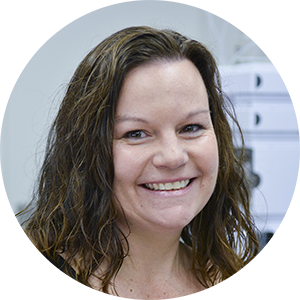
Nichole Reisdorph, PhD
Professor, Mass Spectrometry Facility Director
Email: [email protected]
Nichole received her MS in Biology and her PhD in Molecular Biology and Biochemistry at the University of South Dakota School of Medicine. She was trained in mass spectrometry and proteomic applications at the Scripps Research Center in La Jolla, CA and has extensive background in molecular biology with an emphasis on protein biochemistry techniques. Nichole is an Associate Professor in the Skaggs School of Pharmacy and she directs the UCD SOP Mass Spectrometry Core Facility.
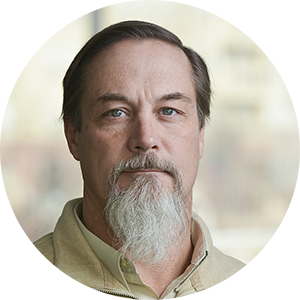
Richard Reisdorph, PhD
Associate Professor
Email: [email protected]
Rick received his PhD in Molecular Biology and Biochemistry from the University of South Dakota School of Medicine and was a fellow with Peter Vogt at the Scripps Research Institute in La Jolla, CA. His work includes developing quantitative metabolomics and proteomics techniques and bioinformatics. He is currently the Assistant Director of the UCD SOP Mass Spectrometry Core Facility.
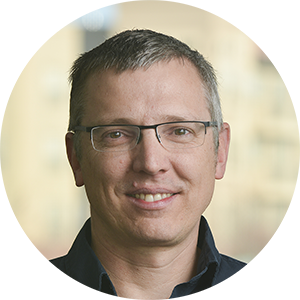
Michael Armstrong, BS
Senior Professional Research Assistant
Email: [email protected]
Michael is a graduate of the University of Northern Colorado with a Bachelor’s Degree in Biology with a Minor in Chemistry. Previous to working in the School of Pharmacy Mass Spectrometry Facility, Michael was a senior analytical chemist at Severn Trent/Core Laboratories for 9 years. His professional interests include mass spectrometry based metabolomics and analytical chemistry. He has over 20 years of mass spectrometry and analytical chemistry experience.
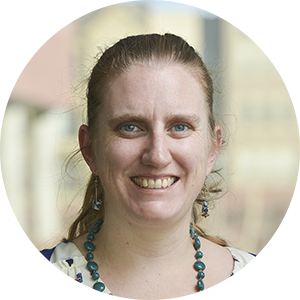
Katrina Doenges, MS
Senior Professional Research Assistant
Email: [email protected]
Kat earned a Bachelor’s of Science degree in Chemistry and Biochemistry from the University of California, Santa Cruz. She went on to earn a Master’s of Science degree with Honors from the University of Canterbury (Christchurch, New Zealand) in Environmental Science with a focus in Environmental Chemistry. She is interested in all aspects of Environmental Chemistry and how environmental factors impact our health. She is the Lab Manager and the “sample prep machine” for untargeted metabolomics projects. She also helps with instrumental analysis, data acquisition and data analysis methods.
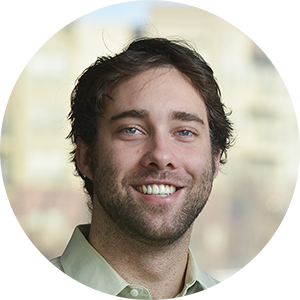
Cole Michel, BS
Senior Professional Research Assistant
Email: [email protected]
Cole graduated from the University of Wisconsin – Madison with a bachelor’s degree in biochemistry. His professional interests are in proteomics, LC/MS method development, and utilizing analytical chemistry techniques for drug discovery. He has over 6 years of mass spectrometry experience and over 10 years of analytical chemistry experience.
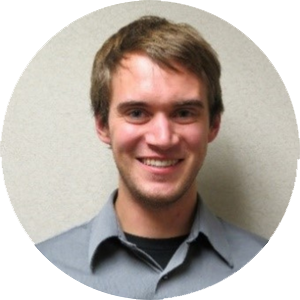
Jonathan Manke
Professional Research Assistant
Email: [email protected]
Jon graduated with a bachelor’s degree in biochemistry from Augustana College. He has two years of experience in analytical food chemistry and over 5 years of mass spectrometry experience. His professional interests are primarily directed toward LC/MS method development and metabolite quantification.
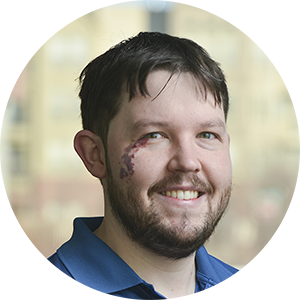
Kevin Quinn, PhD
Post-Doctoral Researcher
Email: [email protected]
Dr. Kevin Quinn graduated from Saint John Fisher College in New York with a Bachelor’s Degree in Chemistry and from the State University of New York at Buffalo with a PhD in Chemistry. He is the Assistant Director of the Mass Spec Core at the University of Colorado, Anschutz Medical Campus. He has over 10 years of mass spectrometry experience and analytical chemistry experience. His professional interests are metabolomics, LC/MS method development, and LC/MS instrumentation.
Authorship
Co-authorship is generally expected when core personnel have made significant contributions to the research in the form of consultation, experimental design, method development, data analysis and/or data interpretation. Significant is defined as “the project would not have progressed, or progressed at a substantially slower pace, without the guidance of facility personnel”. In such cases, core personnel should have the opportunity to review and edit the appropriate sections of a manuscript before submission.
Acknowledgement of facility contributions is expected in publications that include any data generated in the facility. For example, when fee-for-service is performed with no method development and minimum effort by Core personnel. An example of an appropriate acknowledgment is “The authors wish to thank the University of Colorado School of Pharmacy, Mass Spectrometry Facility for analyzing samples”.
Please inform us when relevant publications are accepted and forward us a copy for our records. We may also post citation information on our website. This information is vital to the continued support of the facility.
Grant Assistance
We are very happy to provide letters of support and assistance in grant writing. For letters of support, please allow at least 2 weeks from the time of your request. Please furnish the following information: Title of grant, agency to which you are submitting the grant, your title and mailing address, and 1-3 sentences on the goals (or specific aims) of your proposal.
Our facility is also dependent on grant support for long-term success and we appreciate your support in keeping the facility funded. To determine if percent effort by core personnel is required, please consider the following:
- Does the proposal include a specific aim(s) that focuses on mass spectrometry?
- Is method development is required?
- Are there large numbers of samples are to be analyzed?
- Would the aim or proposal not receive a favorable review without the support of Core personnel?
- Would the project not have progressed, or progressed at a substantially slower pace, without the guidance of facility personnel?
Vendors
Databases
Other Resources
This tool allows interested potential postdoctoral candidates a centralized place to upload their basic information including CV and publications allowing them to e-mail it to up to three faculty member.
The mass spectrometry facility offers a range of services for researchers doing proteomics, metabolomics, or small molecule research. We are continually working to add new services so please contact the facility directly if you do not see a specific service listed or if you are unsure about how to best utilize mass spectrometry in your research. If we are unable to provide the type of analysis you require we can often refer you to another facility that can.
Our current prices can be located here. For services that have hourly rates, contact Cole Michel for pricing.
Assays Offered:
- BCA protein assay
- C18 clean up
- Preomics
- Acetylomics (Digest + IP)
- Skin taping
- In Gel Digest
- In-Solution Digest FASP-Suspension
- In-Solution Digest FASP- Dry
- In-Solution Digest FASP-Immunodepletion
- TFE In-Solution Digest
- ID Gel
- 11 cm 2D Gel
- LC Proteomics
- Accurate Mass Determination
- HPLC Hourly (with labor)
- HPLC Hourly (no labor)
- Immunodepletion using MARS - Human Plasma
- Immunodepletion using MARS - Human CSF
- Immunodepletion using MARS - Mouse Plasma
Assays Offered:
- Various Coverage of the Metabolome Depending on Sample Preparation (Click here for more information).
- Methanol Protein Precipitation Extraction
- Methanol Extraction is suitable for certain cellular extracts
- Methanol extracts typically use one chromatographic method
- Methyl tert-Butyl Ether (MTBE) Liquid-Liquid Extraction (LLE) (JOVE Publication).
- Higher coverage can be obtained by separating the hydrophobic and hydrophilic compounds using LLE
- Hydrophobic and hydrophilic fractions are analyzed using suitable chromatographic methods
- Suitable for cell, biofluid and tissue samples
- Similar coverage as our traditional MTBE Liquid-Liquid Extraction Method, with higher daily sample prep throughput
- Hydrophobic and hydrophilic fractions are analyzed using suitable chromatographic methods
- Suitable for cell, biofluid and tissue samples
- Urine Samples
- Urine samples do not generally need to undergo an “extraction,” but do require some sample handling
- Urine Samples typically use one chromatographic method.
We also offer sample preparation training if you or a member of your lab would like to learn the protocol(s) suitable to process your own samples. Please contact Katrina Doenges for additional information.
Targeted Assays Powerpoint
- Acylcarnitines (See Targeted List)
- Amino Acids (See Targeted List)
- Oxylipins "AKA Lipid Mediators" (See Targeted List)
- Nucleotides Assay (See Targeted List)
- Bile Acids (See Targeted List)
- Endocannabinoids (See Targeted List)
- Leukotriene E4 in Urine
- Polycyclic Aromatic Hydrocarbons (PAHs)
- Steroid Hormones
- 25-OH Vitamin D2 and D3
- Fatty Acid Methyl Esters (FAMES) (See Targeted List)
- TCA cycle (See Targeted List)
Metabolomics and Proteomics Hands-On Workshops
The Reisdorph Lab is offering Hands-On Workshops at the Skaggs School of Pharmacy on the University of Colorado Anschutz Medical Campus in Aurora, CO. Participants will learn introductory metabolomics or proteomics science and applicable protocols and technologies through a comprehensive, hands-on exploration of typical mass spectrometry-based workflows. Class size is limited to 10 participants to ensure excellent participant to instructor ratios. Workshops include topics such as experimental design, sample preparation, mass spectrometry basics, data acquisition, advanced technologies, and quantitative analyses. Over one-half of the workshop is spent in the laboratory, performing sample preparation and acquiring/analyzing data on mass spectrometers. Several lectures and laboratories focus on data analysis strategies.
Please check back later for information on upcoming Metabolomics and Proteomics Workshops.
For more information please e-mail Katrina Doenges.
Below please find our Master Service Agreement template approved by the University's legal department. All outside CU collaborators must have a fully executed MSA prior to our CORE receiving samples and/or performing work.
Please have the signing authority and their respective legal department review and execute. Be aware, the PI's are not authorized to sign on behalf of their Universities, typically. Additionally, a Statement of Work must accompany any new project outside the original MSA, regardless of previous collaboration. Once reviewed and signed, please send this document to your Mass Spec Core contact person. If there are any questions or concerns, please respond to that person as well.
Master Services Template
(doc)
77 KB
23 KB
MAJOR EQUIPMENT INCLUDES:
1 HPLC (Agilent series 1200 with diode array detector and automated fraction collector) for fractionation experiments.
Time of Flight instruments
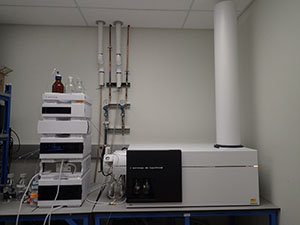
1 LC-MS/MS QTOF system (Agilent series 1290 HPLC modules, Agilent 6550 Quadrupole Time-of-Flight mass spectrometer) with Ion Funnel for high mass accuracy protein identification/characterization and label-free quantitation.
1 LC-MS/MS QTOF system (Bruker maXis impact HD QTOF with Agilent 1260 nanoHPLC modules) for proteomics experiments.
1 LC-MS/MS QTOF system (Agilent series 1290 UPLC modules, Agilent Jet Stream, Agilent 6545 Quadrupole Time-of-Flight mass spectrometer) for high mass accuracy (<3 ppm) metabolomics experiments.
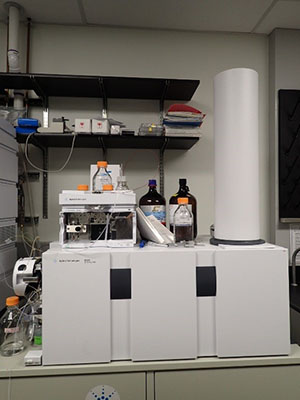
1 LC-MS/MS QTOF system (Agilent series 1290 UPLC modules), Agilent 6520 Quadrupole Time-of-Flight mass spectrometer). As it is a 2008 model, this instrument is used as a back-up for high mass accuracy metabolomics and protein identification/characterization experiments.
Triple Quadrupole Instruments
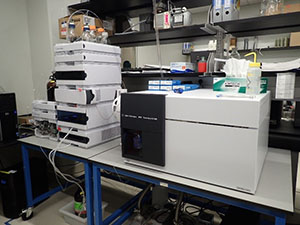
1 LC -MS/MS QQQ system (Agilent series 1260/1290 HPLC components and Agilent 6490 triple quadrupole mass spectrometer with Jet Stream and Ion funnel for targeted, quantitative analysis.
1 LC -MS/MS QQQ system (Agilent series 1260/1290 HPLC components and Agilent 6490A triple quadrupole mass spectrometer with Jet Stream and Ion funnel for targeted, quantitative analysis.
1 LC -MS/MS QQQ system (Agilent series 1260/1290 HPLC components and Agilent 6495 triple quadrupole mass spectrometer with Jet Stream and Ion funnel for targeted, quantitative analysis.
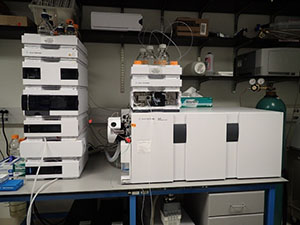
1 LC -MS/MS QQQ system (Agilent series 1200 HPLC components and Agilent 6410 triple quadrupole mass spectrometer with ESI and optional ESI/APCI multi-mode source) for targeted, quantitative analysis. As a 2008 model, this instrument is used for assays requiring less sensitivity than the 6490.
Fourier Transform instruments
1 LC-MS/MS Orbitrap (Thermo Eclipse with ETD and Thermo nanoUPLC and capillary UPLC modules)
Other instruments:
1 GC-MS with headspace capability (Agilent ,)
Mesoscale Discovery (MSD) QuickPlex SQ 120
ICP-MS (Perkin Elmer NexION 2000)
In addition, we have a large Beckman centrifuge, 1 clinical centrifuge, 3 microcentrifuges, a laminar flow hood for contamination-free sample handling, a Bioanalyzer for automated electrophoresis, semi-automated SPE systems, 2 vacuum centrifuges, 2 N2 dryers, and a Lab Conco 2.5 Plus lyophilizer for sample processing. All instruments are fully available to the project. All instruments are located in the SOP mass spectrometry facility.
Agilent Mass Hunter Workstation:
- Qualitative Analysis
- Quantitative Analysis
- Profinder
- Mass Profiler Professional (MPP)
- PCDL Manager
- Pathways to PCDL
- DA Reprocessor
Bruker:
- ProteinScape 3
- Data Analysis 4.2
- ProfileAnalysis 2.1